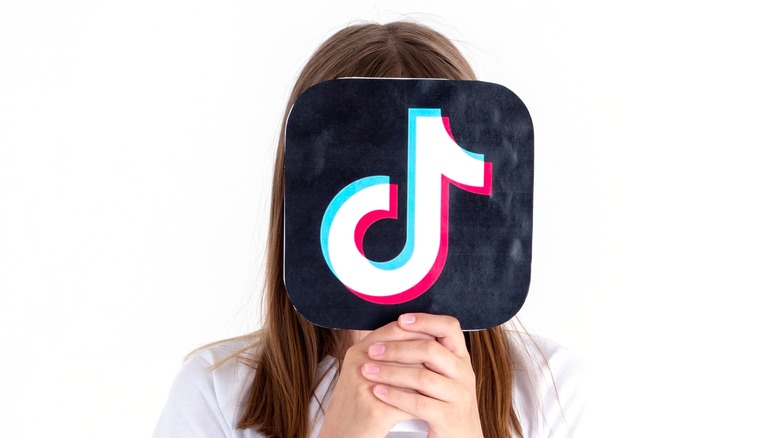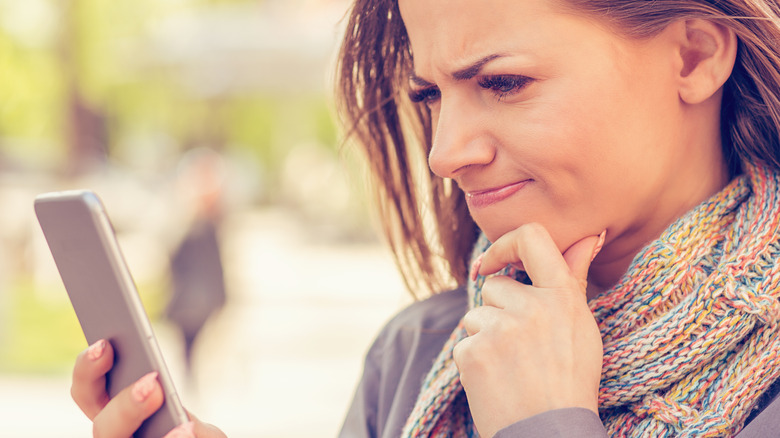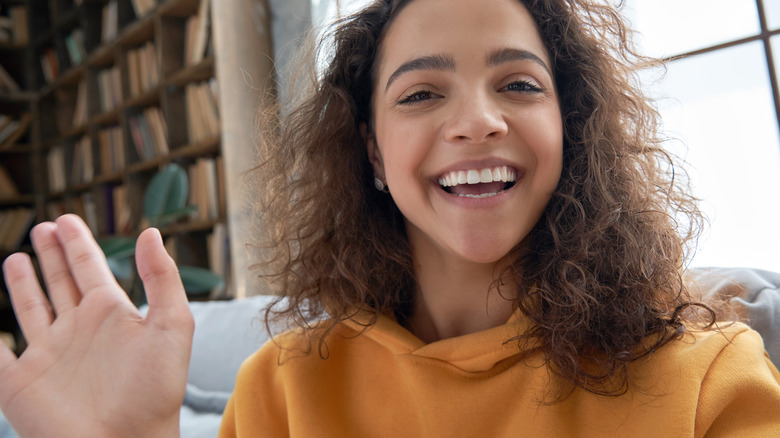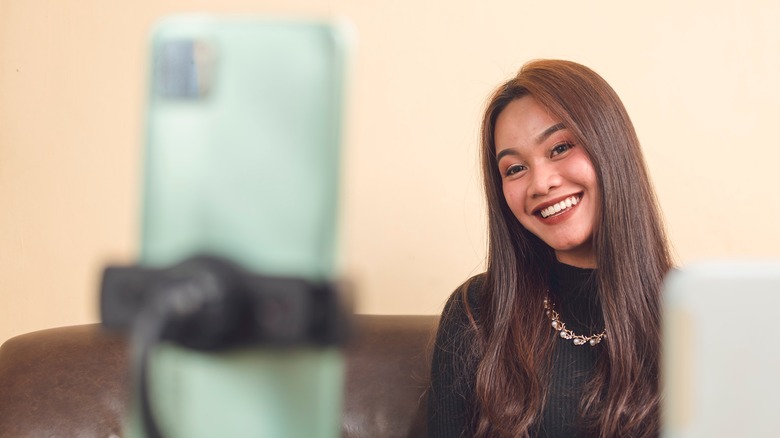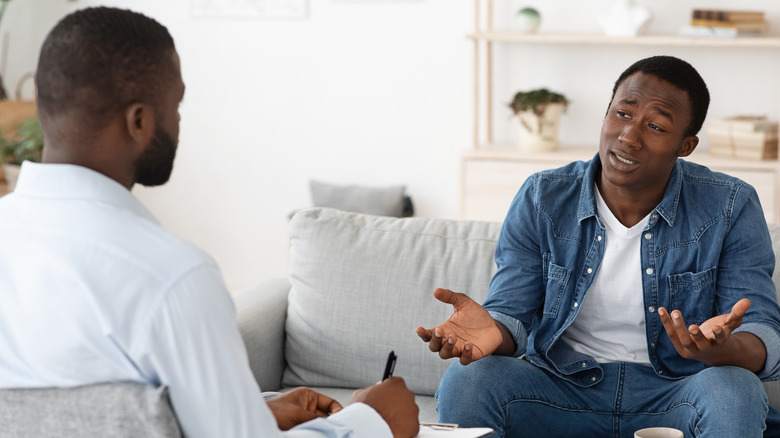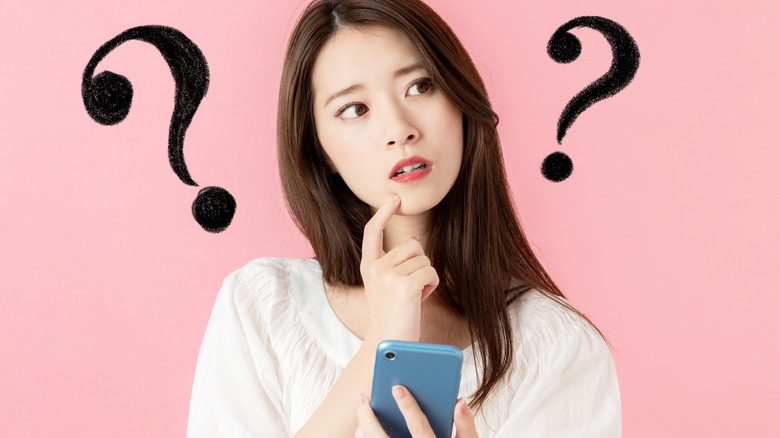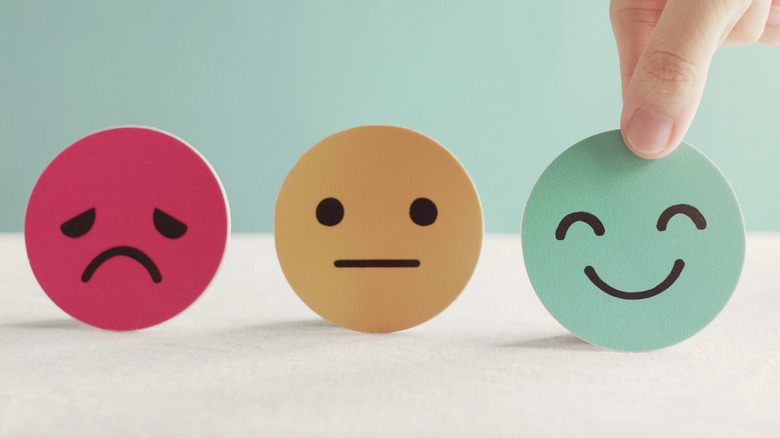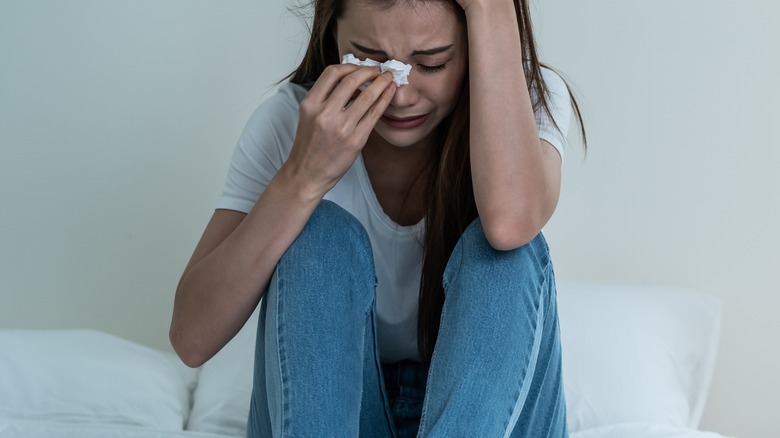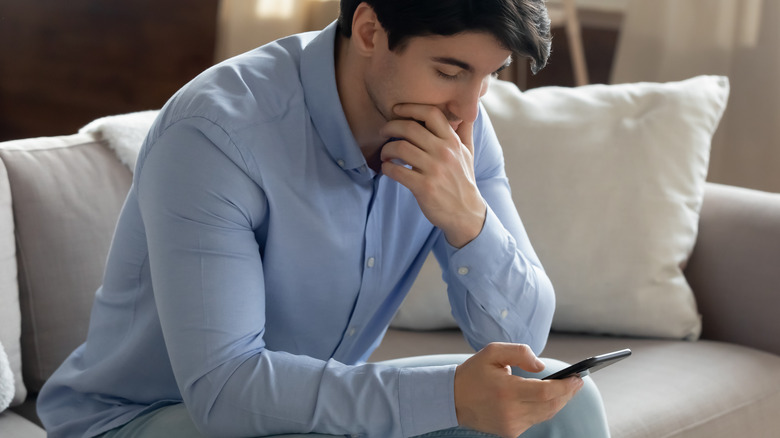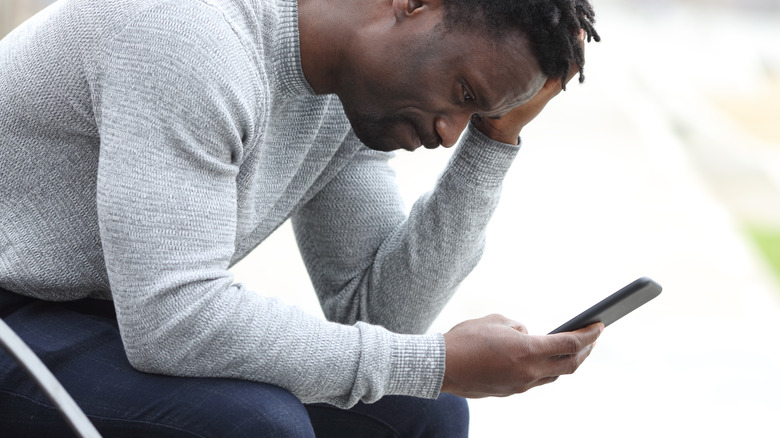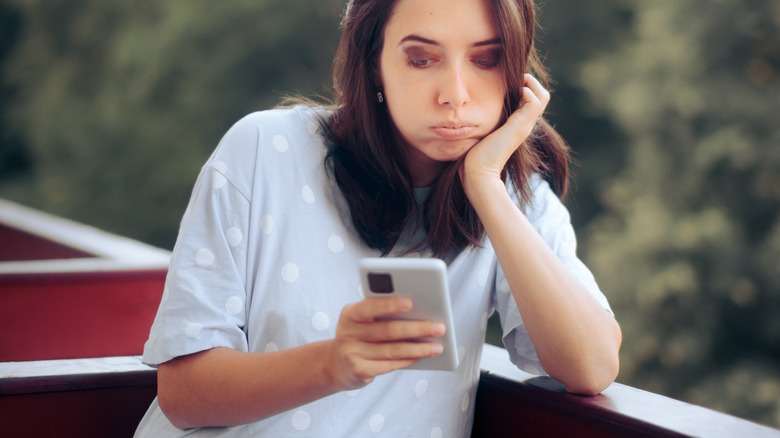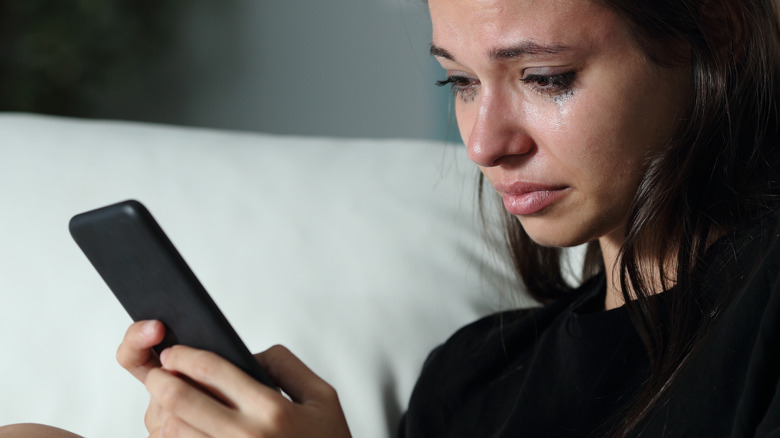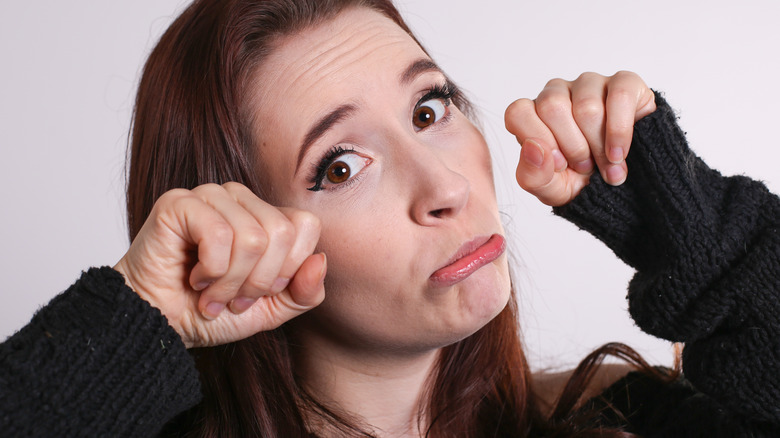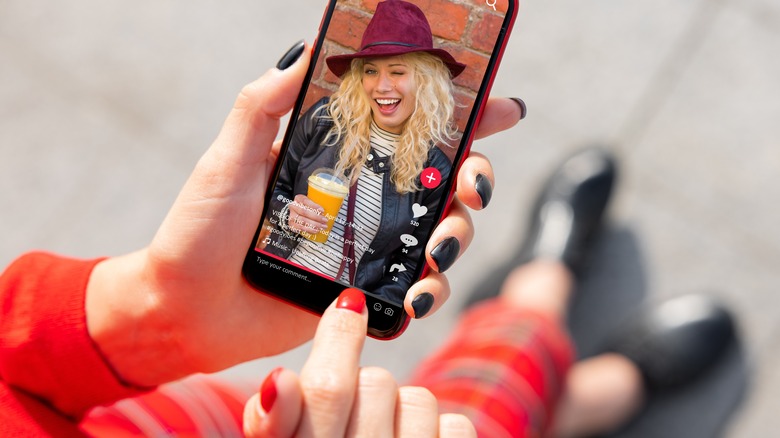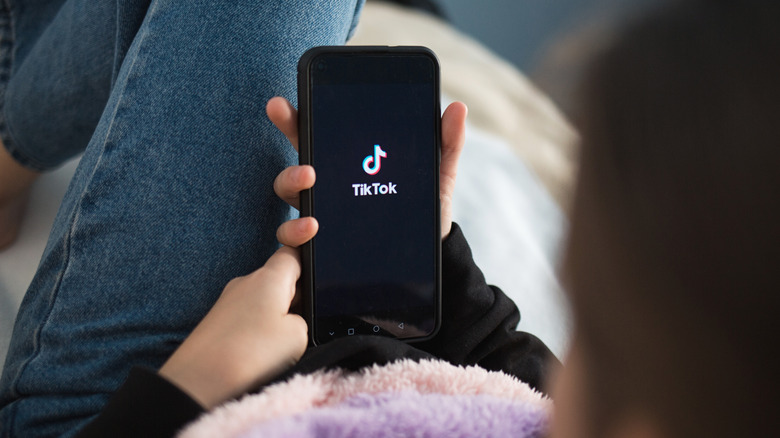What TikTok Gets Wrong About Mental Health
When it comes to mental health, social media, particularly TikTok, is the epitome of a double-edged sword. As the Surgeon General's Advisory on youth mental health points out, social media can play a major role in letting people struggling with mental health know that they're not alone. They can reach out to others living with the same conditions, become part of a community, receive crucial validation, and even find concrete, useful support. However, social media is rife with misinformation about mental health and health in general, some of which perpetuates the stigmatization of mental health diagnoses. It's also a haven for anonymous cyberbullying, which can exacerbate mental health issues.
In spite of these big downsides, TikTok has become a wildly popular mental health resource, especially for Gen Zers. According to the Los Angeles Times, popular mental health hashtags on TikTok had accumulated almost 40 billion views by the beginning of 2022.
Prominent mental health content creators told the LA Times that though TikTok can be a great place to find information about mental health and connect with people with similar experiences with mental health, it's important to understand the potential dangers of making TikTok your only mental health resource. Here are some of the things mental health TikTok often gets wrong.
If you or someone you know needs help with mental health, please contact the Crisis Text Line by texting HOME to 741741, call the National Alliance on Mental Illness helpline at 1-800-950-NAMI (6264), or visit the National Institute of Mental Health website.
The information isn't always accurate
When browsing the TikTok videos tagged #mentalhealth or #anxiety, it's impossible to tell whether the video is made by someone with actual credentials, someone actually living with mental health issues, or some random person who doesn't know what they're talking about at all. And even when you click through to someone's profile, it's still difficult to figure out if the information they're sharing is accurate.
Unfortunately, a lot of the mental health information being shared on TikTok is inaccurate, and some of it's downright misleading or patently false. A study conducted by a team of mental health professionals at Plushcare found that a staggering 83.7% of mental health information shared on TikTok is misleading and 31% of mental health videos on the platform contained inaccuracies. About 14% of TikTok's mental health videos contained information that the mental health professionals considered harmful.
A study published in The Canadian Journal of Psychiatry found that 52% of the videos about ADHD on TikTok were misleading. Additionally, the study found that more than a quarter of the videos about ADHD on the platform focused on people's personal experiences with the condition. The authors posited that presenting personal experience as fact can lead to confusion about ADHD, since every person experiences the condition differently.
When people share misleading or inaccurate information on TikTok, it can easily reach millions of people — which means that misinformation shared on the app spreads quickly.
Creators aren't always experts
TikTok creators don't have to be mental health professionals to create mental health content. In fact, Plushcare's team of mental health professionals found that only 9% of the people sharing mental health information on TikTok were qualified mental health professionals. A study analyzing the accuracy of ADHD content on TikTok found that just 12% of the videos were made by healthcare professionals.
However, it isn't easy to tell whether or not mental health TikTokers are mental health professionals. TikTok's bios are short, and not everyone uses that space to share their credentials. And content creators aren't readily pointing out that they aren't qualified. Plushcare found that only 1% of videos contained a disclaimer about the creator's lack of mental health training. So, as Mashable points out, it's exceedingly easy to mistake content creators for mental health professionals, especially when many creators are marketing themselves as "coaches."
Sometimes these creators are giving useful advice. However, they're often giving advice based on personal experience that's not applicable to the wider population, and sometimes they're giving advice that isn't backed by science. And there's no great way to determine which content is good and which is bad without doing some digging. So, a lot of misinformation on TikTok gets taken as fact simply because the creator sharing the content is popular.
Lived experience isn't expertise
The majority of the people posting content about mental health on TikTok aren't qualified mental health professionals, but per The Washington Post, they argue that they have a different kind of qualification: lived experiences. Many mental health TikTok creators are diagnosed with the mental health conditions about which they're making content. One study analyzing the content of videos with hashtags related to mental health found that the majority of videos shared personal experience with mental health conditions rather than facts. The same study found that the top comments on each of those videos were also dominated by experience-sharing. While these videos and their comments sections are a great way for people to connect, receive validation, and learn that their struggles aren't unique, they can also misrepresent mental health conditions.
Multiple mental health professionals told The Washington Post that one person's life with a mental health condition can look very different from someone else with the same condition. Additionally, many of the actions and personality quirks creators attribute to their diagnoses aren't actually symptoms of that condition.
So, even though sharing personal experiences is often done with the intention of raising awareness or removing stigma, it can actually lead to pervasive misunderstanding of mental health conditions like ADHD, anxiety, and depression. This is one of the myriad reasons why it's important to get mental health information from qualified professionals in addition to people with lived experience.
Seeing a professional is important
Even when the people creating mental health content on TikTok are qualified mental health professionals, their videos aren't going to provide the same benefits as actually working with them.
Jaime Mahler, a licensed therapist with a major TikTok following, told USA Today that mental health TikTok is a great way for people to get information about mental health conditions, receive validation that their experiences are real, and become familiar with the conditions that may impact their daily lives. And, as Mashable states, access to licensed healthcare professionals is limited for a massive number of people in the United States, especially people with marginalized identities. For the many people who can't see a therapist, therapists on TikTok are providing valuable information that can help.
However, Mahler stressed that people aren't going to get better by watching TikTok videos. Yes, many therapists on TikTok create videos about effective coping mechanisms and ways to decrease symptom frequency that work for some people, but it's not the same as getting a treatment plan that's tailored to your symptoms and your needs. To truly work through mental health issues, people need a one-on-one relationship with a mental health professional who can properly assess their history, symptoms, and struggles, determine the right diagnosis, and formulate a treatment plan.
Self-diagnosis isn't safe
Though TikTok creators are doing great work to remove stigmas and educate people about mental health conditions, their content has also produced a trend that many mental health professionals find concerning. According to Dr. Adeola Adelayo of Banner Health, people are using information they found on TikTok to diagnose themselves with all kinds of mental health conditions.
Dr. Adelayo says that the videos create a kind of "horoscope effect," where people start to look for ways in which the content reflects their lives and find correlations that aren't there. In the most extreme cases, people can actually start manifesting symptoms of disorders they don't have. Adelayo explained that his behavioral health unit recently saw a large number of teenage girls displaying symptoms of Tourette's syndrome, even though they'd never been diagnosed with the condition. The only thing they all had in common was following the same TikTok influencer with Tourette. Adelayo emphasized that these girls had circumstances that made them prone to this behavior, but added that teens are very susceptible to suggestion. That can manifest as mimicking a mental health condition.
Dr. Michael J. McGrath told Salon that self-diagnosis can have serious consequences, especially if people try to pursue treatment without a proper diagnosis. He and other mental health professionals that spoke to Salon stressed that working one on one with a qualified professional is the only way to get a proper diagnosis and appropriate treatment plan.
Mental health can't be oversimplified
Mental health is complex and complicated, licensed professional therapist Faith Arkel told WebMD, and there's no way to convey all the information someone would need to know about a concept in a 3-minute-long video. Like many therapists, Arkel agrees that many TikTok creators are doing a great job smashing the stigma that's surrounded mental health for decades and providing basic information about common conditions. However, the short-form content TikTok thrives on only provides the Cliffs Notes version, which can be easily misinterpreted.
In an article for Psychology Today, Dr. Ahona Guha pointed out that much of the mental health content on TikTok relies on broad overgeneralizations that may resemble fact but fail to convey the bigger picture. Dr. Guha wrote that the oversimplification of complex mental health issues can make people think that relatively normal behavior is actually the result of a mental illness.
Oversimplified mental health content can also lead to incorrect correlations between symptoms and diagnoses, ADHD specialist Matthew Haring told ADDitude Magazine. Many people with mental health issues have co-occurring diagnoses, but this often isn't covered in short TikTok videos. So, when someone with ADHD and depression talks about their suicidal ideation, someone may believe that suicidality is a symptom of ADHD and seek treatment for that instead of depression.
All of these experts stressed that there are real-life risks to making complex and complicated concepts into quirky content.
Mental illness isn't glamorous
In a 2013 article for The Atlantic, writer Anne-Sophie Bine explored the concept of "beautiful suffering" — the idea that struggling with mental illness makes people "mysterious, haunted, fascinating" — on Tumblr, a microblogging site popular with teens at the time. Experts Bine spoke to said that even then, social media was pushing the narrative around mental health, taking suffering out of the shadows and making it part of mainstream conversation. However, the unexpected side effect of this destigmatization was that mental illness became glamorized or romanticized.
A study on the glamorization of mental illness on social media found that today's teens and young adults "now see mental disorders as relatable, normal and desirable." Participants in a focus group conducted as part of the study said that mental health conditions were so normalized on social media that they've become "a trend." Evan Lieberman, a clinical social worker, told the Wall Street Journal that teens seem to be "using mental-health diagnoses as a social currency." In other words, social media, especially mental health TikTok, has made having a mental health diagnosis cool.
Though there's a lot of value in removing the shame historically associated with mental health diagnoses, experts say there's also a lot of harm in glamorizing or romanticizing them. Doing so obscures the fact that these conditions are serious, dangerous, and potentially fatal if not properly treated.
Trauma dumping
Therapist and YouTuber Mallory Grimste told Insider that trauma dumping refers to people sharing about their traumatic or negative experiences without ensuring that the person they're sharing with has the mental and emotional capacity and stability to hold space for and process that information. The term was originally used to describe the phenomenon of people messaging public figures who'd shared about their own traumatic experiences or mental health struggles to talk about similar experiences. The messages, often hundreds or thousands of them, were sent without any thought to the impact they would have on the public figure's mental health.
Trauma dumping has a slightly different meaning on TikTok, according to Vice. On TikTok, oversharing about trauma and mental illness is so mainstream that anyone can come across a potentially triggering video at any time, without any warning. Vice writer Julie Fenwick says this amounts to trauma dumping on a massive scale. People browsing the app's For You Page may come across videos about abuse, suicide, rape, eating disorders, or any number of complicated mental health issues, whether or not they're in a mental and emotional space where they can handle that kind of content. Shannon Thomas, a trauma therapist, told Insider that trauma dumping on social media sites like TikTok can essentially retraumatize people.
Consuming mental health content can make symptoms worse
Though many people seek out mental health content on TikTok to help them cope with their mental health conditions, research suggests that consuming mental health content on social media may actually make their symptoms worse.
One study published in the Journal of the American Academy of Child and Adolescent that examined social media usage among adolescents who were admitted to psychiatric hospitals found that 16% of participants had viewed content promoting self-harm and 15% had viewed content promoting suicide on social media within the two weeks prior to their admission. The authors of this study posited that exposure to this content as well as other negative experiences on social media can exacerbate symptoms of mental health conditions in teens. Professionals with firsthand experience tend to agree. Rachel Ambrose, a nurse in a psychiatric ward for teens, told Refinery29 that a lot of the mental health content on TikTok is made by people who are really struggling with their own mental health, and that content ends up being "unhelpful" to the people consuming it.
Additionally, research into the impacts of social media on mental health symptoms have found that increased social media use is correlated with increased anxiety symptoms, as well as increased symptoms of depression. So, it's hard to discern whether mental health content on social media is making a net positive or net negative impact on those struggling with mental health conditions.
FOMO can make depression and anxiety worse
Fear of missing out, commonly called FOMO, refers to the negative feelings experienced when people think that they're "missing out" on a social experience. Research has shown that FOMO is a manifestation of the deep-seated desire to be included or part of the group and driven by the natural tendency to compare ourselves to others. Researchers have posited that social media intensifies FOMO by delivering a constant stream of content about what people are doing and providing constant opportunity for comparison.
Additionally, research has shown that FOMO negatively impacts mental health. One study published in the journal New Media & Society found that FOMO increased social media usage, and social media also increased feelings of FOMO. The study also concluded that FOMO and social media usage increased levels of depression, anxiety and loneliness. Another study found that over 30% of teens who were admitted to psychiatric hospitals "felt left out or excluded" during interactions on social media within two weeks before they were admitted.
According to one paper published in Frontiers in Public Health, TikTok's design encourages FOMO to increase engagement with the platform. This engagement is exacerbated by push notifications that draw the user back in. TikTok's "challenges” also encourages users to compare themselves to each other. Essentially, TikTok thrives on FOMO and comparison, which can have a negative impact on the wellbeing of people using the app.
Cyberbullying is rampant and uncontrolled in the comments
Even when mental health creators are making supportive, encouraging, and accurate content, they have little control over what happens in their comments' sections. Unfortunately, per Psychology Today, those comments sections are filled with cyberbullying. Often, this bullying is targeted at the creators. However, people in the comments endure cyberbullying as well (via Common Sense Media).
Cyberbullying has major impacts on its victims. A meta-analysis of research into cyberbullying found that people who'd been cyberbullied were twice as likely to engage in self-harming or suicidal behaviors and twice as likely to struggle with suicidal thoughts. The National Crime Prevention Council found that almost one-third of teens who'd been cyberbullied were hurt by the experience and nearly 15% felt scared, indicating that cyberbullying has major impacts on mental health.
TikTok takes a strong stance against bullying on its platform, and has implemented several features to curb the problem. However, Natalie Bazarova of the Social Media Lab at Cornell University wrote in Psychology Today that these features do little to prevent cyberbullying from occurring. Rather, they provide users a way to respond to bullying in the comments section.
In reality, it's hard to avoid bullying on TikTok, which can make the app triggering for people struggling with their mental health.
Faking mental illnesses
Mental health influencers on TikTok are typically people living with the condition they're posting about, per Inverse. Many of them, like Asher who runs the TikTok account @theasystem, started posting on TikTok to meet other people with their diagnosis. Others joined TikTok to learn more about their condition.
Though many of these mental health influencers have found the support they sought on TikTok, they've also found a unique form of cyberbullying: being accused of "faking" their mental illnesses to get famous. Becca, who runs the account @tourettesbian, told Vice that she's constantly accused of faking Tourette's and that it was "damaging" to her mental health. Like Becca, the vast majority of people posting on TikTok about particular mental illnesses are people who legitimately have the condition, and the accusations of being "fakers" make living with their conditions even harder.
However, Dr. Marc Feldman told Vice that there is a segment of people on the app who are pretending to have mental illnesses. He said that this phenomenon is akin to the condition Munchausen's, a mental illness in which a person pretends to be sick because they have a deep need for sympathy and attention. Feldman stressed that these people actually are struggling with mental illness, just not the one they're pretending to have. The number of "fakers" on TikTok is likely very small, but the amount of people being accused of faking is not.
Finding good #mentalhealth information on TikTok
There's not necessarily anything wrong with looking for mental health information on TikTok. It can be a great way to get easy-to-digest facts, tips and tricks, and even some new coping skills. However, finding reputable influencers to follow is essential. Though it can be difficult to distinguish the experts from the amateurs, there are a few ways to tell the difference.
Mashable suggests doing some research on the creators offering mental health advice on TikTok. Unfortunately, you can't always trust the information in creators' bio descriptions. Multiple creators have been busted for claiming they were licensed mental health professionals when they actually weren't. So, head to Google and see if you can find any evidence that the creator is actually a licensed mental health professional before you follow them. Yes, it's extra work, but it's worth it to know the advice you're getting is credible.
Looking for creators who cite sources in their content is another great way to determine which ones are sharing good information. The Washington Post suggests researching claims made by creators before taking them seriously. It's also a good idea to check if creators with mental health qualifications are talking about the same information as your favorite mental health influencers. If your favorite influencers are talking about it but not the experts, that's a big red flag.
Ultimately, if something doesn't feel right, trust your gut and do some research off of TikTok.
Protecting your mental health on #mentalhealth TikTok
Browsing mental health TikTok can be really beneficial. As Tracy Kennedy writes for Lifehack, TikTok can connect you with people who have similar life experiences and give you information that helps you understand yourself better. However, it can also take a seriously negative toll on your mental health.
Kennedy says it's all about how you use the app. She suggests being conscious of when you're using TikTok to compare yourself to other people, especially if you're always coming up short in your own assessment. Additionally, pay attention to how you're scrolling. Are you actually taking in the content? If not, you might be mindlessly scrolling because you're bored or tired. Are you doomscrolling? This can be particularly detrimental on mental health TikTok because doomscrolling itself triggers anxiety and changes your perspective on the world, and you're likely to encounter triggering content. If you're mindlessly scrolling or doomscrolling, it's time to put down the phone.
Trauma therapist Christine Gibson told the Washington Post that it's also important to pay attention to how you feel when you watch TikTok videos. Videos that make you feel uncomfortable, anxious, angry, or sad probably aren't helpful. Try to stick to the content that actually gives you a mental boost.
Mental health TikTok can be a great place to find the resources you need, but don't stop there. Make sure that you're accessing other resources to take care of your mental health, and always scroll with care.

